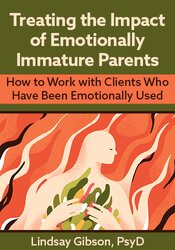Description
Chances are you’ve come across the type of client who constantly puts others first, out of guilt or loyalty, which holds them back from their own self-development. Would it surprise you to learn that many of these clients grew up with emotionally immature parents? These parents often acted like children themselves in terms of their coping mechanisms, affective instability, and disregard for other people’s lives and feelings. Many times, this leaves their children feeling powerless—even into adulthood. You’ll discover:
- Common psychological impacts on children of emotionally immature (EI) parents
- How to spot specific forms of emotional coercion and pressures of moral obligation
- How EI parents set up a child for relationship problems in adulthood
- Which therapeutic techniques work best to strengthen sense of self and healthy entitlement
CPD
Planning Committee Disclosure - No relevant relationships
All members of the PESI, Inc. planning committee have provided disclosures of financial relationships with ineligible organizations and any relevant non-financial relationships prior to planning content for this activity. None of the committee members had relevant financial relationships with ineligible companies or other potentially biasing relationships to disclose to learners. For speaker disclosures, please see the faculty biography.
CPD
This online program is worth 2 hours CPD.
Speaker
Lindsay C. Gibson, PsyD, is The New York Times and Amazon #1 best selling author of Adult Children of Emotionally Immature Parents: How to Heal from Distant, Rejecting, or Self-Involved Parents (New Harbinger, 2015). Her groundbreaking work has sold over 100,000 copies, been translated into 37 languages, and empowered thousands to break free from toxic legacies and reclaim their lives.
With over 30 years of experience as a psychotherapist and psychdiagnostician, Dr. Gibson identified that many clients’ anxiety, obsessions, and depression stemmed from distorted beliefs and emotional coercion imposed by emotionally immature parents. She observed that while these parents might not fall into severe mental health categories, their emotional immaturity had profoundly damaging effects on their children.
Dr. Gibson currently works as a clinical psychologist in private practice. Her follow-up book, Recovering from Emotionally Immature Parents: Practical Tools to Establish Boundaries and Reclaim Your Emotional Autonomy (New Harbinger, 2019), offers practical strategies for overcoming these challenges and fostering emotional resilience.
Speaker Disclosures:
Financial: Dr. Lindsay Gibson maintains a private practice. She is a published author and receives royalties. Dr. Gibson receives a speaking honorarium and recording royalties from PESI, Inc. She has no relevant financial relationships with ineligible organizations.
Non-financial: Dr. Lindsay Gibson has no relevant non-financial relationships.
Additional Info
Access for Self-Study (Non-Interactive)
Access never expires for this product.
For a more detailed outline that includes times or durations of time, if needed, please contact cepesi@pesi.com
Questions?
Visit our FAQ page at www.pesi.com/faq or contact us at www.pesi.com/info
Objectives
- Identify the characteristics of emotional immaturity.
- Describe the common psychological impacts on children of emotionally immature parents.
- Discuss the forms of emotional coercion, emotional takeovers, and pressure of moral obligation.
- Articulate how EI parents set up a child for relationship problems in adulthood.
- Employ at least one therapeutic technique to strengthen sense of self and healthy entitlement.
Outline
- The five most common traits of emotional immaturity
- The most common psychological impacts on children of emotionally immature parents
- Forms of emotional coercion, emotional takeovers, and pressure of moral obligation
- How emotionally immature people (EIPs) control others
- Why adult children of emotional immature parents (ACEIP) are vulnerable to relationship problems in adulthood
- The ACEIP is afraid to set boundaries; doesn't know what is reasonable
- Why imposter syndrome, anxiety, depression, and inadequate boundaries abound
- The most effective therapeutic techniques to strengthen sense of self and healthy
- Burnout considerations when the therapist is also an adult child of EI parents
Target Audience
- Psychologists
- Physicians
- Nurses
- Counsellors
- Marriage and Family Therapists
- Addiction Counsellors
- Social Workers
Reviews
Overall:
5
Total Reviews: 8


 Online CourseFrank Anderson’s Master Class in Internal Family Systems Therapy£999.98Frank Anderson’s Master Class in Internal Family Systems Therapy29 Jan, 2024Frank Anderson’s Master Class in Internal Family Systems Therapy£999.98
Online CourseFrank Anderson’s Master Class in Internal Family Systems Therapy£999.98Frank Anderson’s Master Class in Internal Family Systems Therapy29 Jan, 2024Frank Anderson’s Master Class in Internal Family Systems Therapy£999.98 BookWritten by three leading experts in the fields of disordered eating, mental health, and trauma-informed care, this book will become your go-to guide for learning how to reject diet culture, heal your£18.99Written by three leading experts in the fields of disordered eating, mental health, and trauma-informed care, this book will become your go-to guide for learning how to reject diet culture, heal your20 Feb, 2024Written by three leading experts in the fields of disordered eating, mental health, and trauma-informed care, this book will become your go-to guide for learning how to reject diet culture, heal your£18.99
BookWritten by three leading experts in the fields of disordered eating, mental health, and trauma-informed care, this book will become your go-to guide for learning how to reject diet culture, heal your£18.99Written by three leading experts in the fields of disordered eating, mental health, and trauma-informed care, this book will become your go-to guide for learning how to reject diet culture, heal your20 Feb, 2024Written by three leading experts in the fields of disordered eating, mental health, and trauma-informed care, this book will become your go-to guide for learning how to reject diet culture, heal your£18.99









